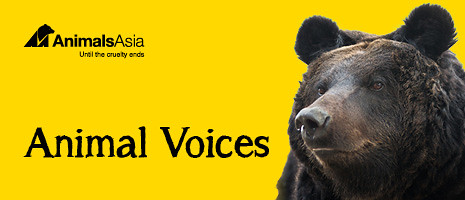Should animals ever work for us?
16 September 2015
In the second instalment of a six-part series, Animals Asia's Animal Welfare Director Dave Neale discusses how we draw the line on the use of animals.
Q: Animals have long been used in the service of people, such as elephants used for logging in Southeast Asia. But obviously you need to draw a line somewhere – for example, milking bears for their bile is unacceptable. How do you draw the line between what’s acceptable and what’s not in people-animal interactions?
Fundamentally, we should not base our decisions of acceptability on how close we feel to other species, but on something more basic – the ability for other animals to suffer. If we do this, it quickly becomes morally unacceptable to cause animals such as chickens, cows and pigs to suffer for our personal gain.
This by definition means that most uses of animals are unacceptable, because they have a negative impact on an animal’s welfare.
The example of the use of elephants in Southeast Asia is an interesting one. A lot of logging elephants become tourism elephants when they are retired from the logging camps. There’s a huge demand for them in Thailand, Laos and Cambodia, but the welfare of the elephants at these camps varies greatly. People may assume that because the elephants are taken from logging camps and are now used for tourism, their welfare must be quite good. But the reality is their welfare might still be suffering. In many cases they cannot socialise as they would in the wild. Often they are chained, and almost all are under the control of a mahout, which will restrict their freedom and choices.
We should give animals as near a natural life as possible, and to do this tourist camps need to become sanctuaries where people can come and see elephants being elephants. There shouldn’t be a place for us to have our own ‘personal experiences’ by having our photographs taken with them. Just to observe and watch elephants being elephants should be experience enough.
This is the case for all animal use. It is only acceptable when the animal is able to participate in natural behaviours and is in a position that allows them to fulfil their physical and behavioural needs. If this is not the case then it is unacceptable, as it has a negative impact on that individual animal’s welfare.

As Animals Asia’s Animal Welfare Director, David Neale works to improve the plight of animals in zoos and safari parks and increase overall veterinary and welfare standards in countries in Asia. His prolific career has taken him all over the world, rescuing animals in Bolivia, working as an ecologist in England and promoting animal welfare education in schools and universities. Since joining Animals Asia in 2002, David has traveled extensively across the continent helping to rescue moon bears in Vietnam and carrying out zoo investigations in China.
BACK






 Healing the hidden wounds
Healing the hidden wounds
 Early summer awakening at the China Bear Rescue Centre
Early summer awakening at the China Bear Rescue Centre
 5 reasons the dog meat trade must end
5 reasons the dog meat trade must end